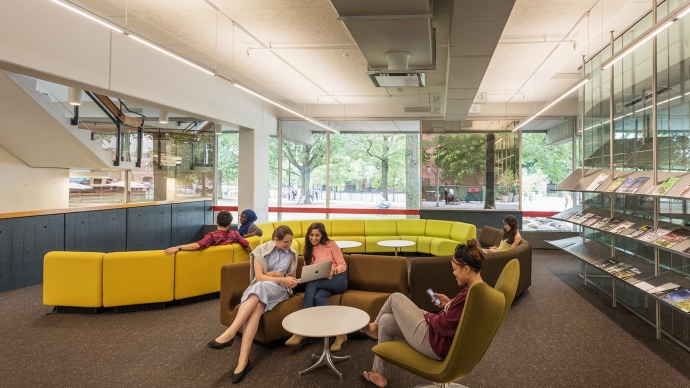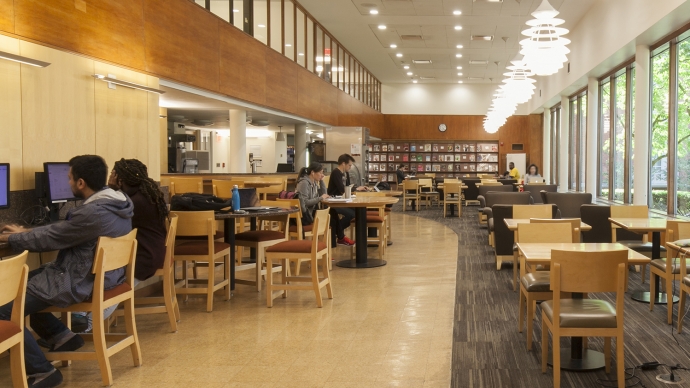You probably already know you can check out a book from Widener and book a study room in Cabot, but the libraries offer so much more. Find tips on how to get started with library spaces, materials, and online resources.
Which library is right for me?
Libraries belong to you. Your Harvard ID gets you access to all the libraries on campus. Need to snack while you study? Choose Cabot. Prefer silence? Visit Widener. Reading for fun? Browse the Farnsworth Room in Lamont.
Use Find a Space to see photos of libraries before you visit. Browse library spaces by noise level, seating type, and other features.



Types of library collections
- Circulating collections: Most items are available for you to borrow, like books, laptops, or musical scores. Circulating libraries, like Widener or Gutman, also offer spaces for individual and group study.
- Special collections: These libraries have rare and unique items, which are available for scanning or scheduled visits. Bring your curiosity. Special collections like those at Houghton or Schlesinger want students to come explore.
- Local public libraries in Cambridge and Boston: Great for Kindle books, leisure reading, museum passes and events.
How to make HOLLIS understand what you need
Searching in HOLLIS
HOLLIS is the Harvard Library catalog. It searches most library resources in a single unified search, including books, articles, media and more.
Make your search more specific:
- Add a search term: instead of Barack Obama try Obama healthcare.
- Select a filter like, Show Only > Peer Reviewed Articles or Resource Type > Images, to limit your results.
Know what you're searching:
- HOLLIS searches item descriptions, also known as the item's metadata, like author, title, date, abstract, and subject heading.
- HOLLIS does not always search an item's full text.
Try search operators:
- Search operators, like AND and NOT, are special commands that combine your search words in specific ways.
- There is a core set of commonly used operators, though you will find occasional variations: HOLLIS uses NOT, where Google uses a minus sign (-).
Meet an expert in your field
We're here to help
You're not supposed to do your research alone. Librarians are available to work with you at any point in your research process. From developing a research topic, choosing sources, and sharing your research - we're here for you.
Visit ask.library.harvard.edu and ask to be connected with the librarian who specializes in your topic. Or reach out to any librarian you've met.
You can also find a liaison librarian who specializes in a particular field.
Questions your librarian might ask:
- What is your immediate goal?
- How big is this project? Is there an assignment prompt? What's your timeline?
- What have you already done?
- How do you feel about the materials you already have? How did you find them?
- What do you want to know?
- What are you trying to learn with this project? Where are you feeling lost or confused?
Questions to ask your librarian:
- What's a good way to refine my topic?
- How can I tell which sources will be most useful for this project?
- What tool for formatting citations and organizing PDFs best fits my needs?
- Do I need copyright permission for the material I want to reuse?

Get free articles anywhere on the web
What's better than Google & faster than HOLLIS? Databases.
Specialized search engine
The right tool for your project may be a specialized search engine, also known as a database. Databases are subject-specific or format-specific search tools. You might know JSTOR or Academic Search Premier, but there are hundreds more.
When and why to use a database
- Find things that you might not see in HOLLIS or Google
- Results are focused, relevant, and trustworthy
- More specialized search options, like specific filters

Find Materials Fast Using Call Numbers
Understanding call numbers
You can get something off the shelf right now if you know how to read a call number.
A call number is the code that shows you where something is on the shelf. They organize things by things like topic, region, year, or format. The libraries at Harvard use multiple call number systems, including Library of Congress, Dewey, or Old Widener.
Have a call number?
- There are charts, maps, and staff ready to answer questions in each library so you can get to the right place.
- Or you can always request a book for pickup in HOLLIS. Pick them up from a library's main desk.
Find Call Numbers in HOLLIS
- From your HOLLIS results, select an item title to open the detailed record
- Find detailed call number information in the “ACCESS OPTIONS” section at the bottom of the record
- Physical items shelved onsite have call numbers, but many other items do not
Use call numbers for a virtual shelf browse
- Use "Starts with/Browse" to explore items in HOLLIS by call number - visit the HOLLIS User Guide for tips on Starts with/Browse
- This is useful for exploring collections that are not open for browsing, like the Government Documents collection in Lamont Library.